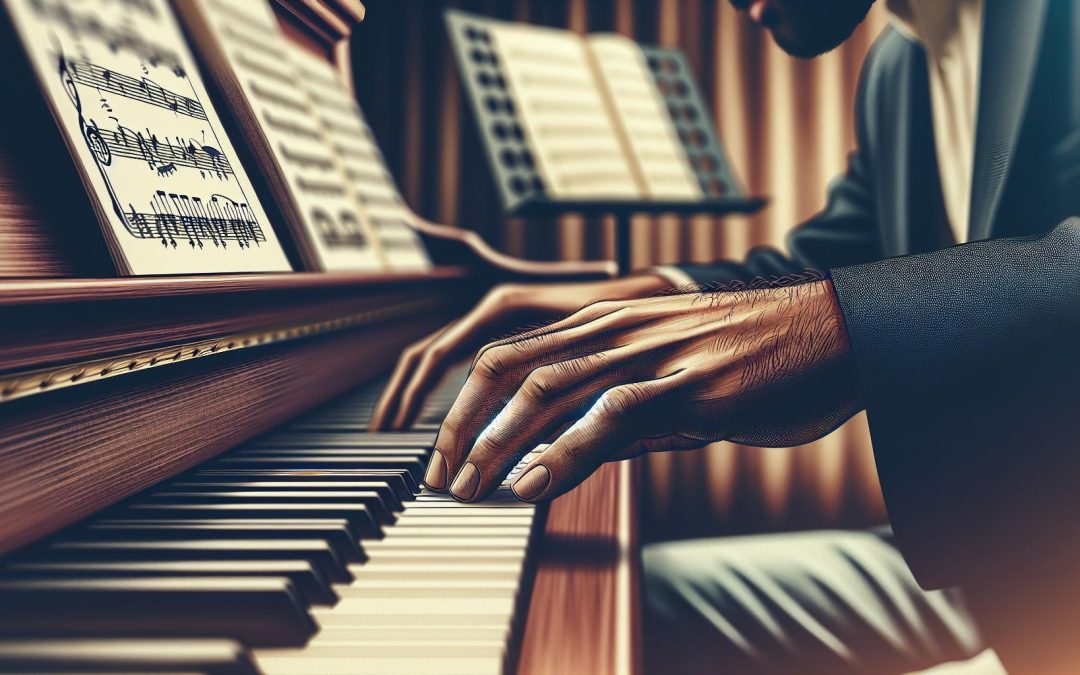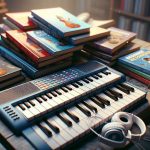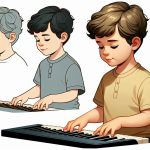Embarking on the journey to learn piano is like stepping into a world of melodies and harmonies. But one question often plays on every beginner's mind: "How long will it take to get good at it?" The answer isn't as straightforward as one might hope, but it's a fascinating exploration into the realms of dedication, practice, and passion.
The timeline to becoming proficient at piano varies greatly from person to person. Factors like practice frequency, natural aptitude, and the quality of instruction play significant roles in shaping one's musical journey. It's about finding the rhythm in the learning process and enjoying the music that comes from one's fingertips.
Understanding the journey to piano proficiency is key to setting realistic expectations and milestones. Let's dive into what it truly takes to master those black and white keys, keeping in mind that every pianist's path is uniquely their own.
Setting Realistic Expectations
When embarking on the journey of learning piano, it's vital for students to set realistic expectations. This not only helps in measuring progress but also in maintaining motivation over time. Understanding that everyone’s journey is different based on various factors including the frequency of practice, natural aptitude, and the quality of instruction, can make a significant difference in how one approaches learning.
Firstly, practice frequency is a crucial element in gauging how quickly one might improve. A common misconception is that spending long, irregular periods at the piano will yield quick results. However, consistency is key. Short, daily practice sessions are far more effective than sporadic, marathon ones. Here's a quick look at how practice time might influence progress:
| Practice Frequency | Expected Progress Timeline |
|---|---|
| 15 minutes daily | Steady, gradual improvement |
| 30 minutes daily | Noticeable progress in months |
| 1 hour daily | Rapid skill development |
Moreover, acknowledging that natural aptitude plays a role in learning speed can help set realistic milestones. Some individuals may grasp musical concepts and techniques quicker than others. This is perfectly normal and should not discourage students who find certain aspects challenging. It's about the journey, not a race.
The quality of instruction received cannot be overstated. A skilled teacher who can provide tailored feedback and guidance is invaluable. They can accelerate learning by focusing on a student's weaknesses and harnessing their strengths. Whether it’s through traditional one-on-one lessons or modern online tutorials, the right guidance is crucial for optimal progress.
Regardless of the approach, patience and persistence are key virtues. It’s important for learners to celebrate small victories and understand that setbacks are part of the growth process. Setting small, achievable goals can greatly enhance the sense of accomplishment and encourage further practice.
Lastly, students should adjust their expectations based on their goals. Are they aiming to become concert pianists or to enjoy playing favorite tunes at home? The ambition level will significantly shape the learning curve and expectations. It’s about finding joy in the process and progressing at a pace that feels rewarding and fulfilling.
Importance of Practice Frequency

When it comes to mastering the piano, practice frequency isn’t just important; it's critical. Learning to play an instrument is similar to learning a new language or skill—it requires consistent repetition and engagement. However, the way one practices, and how often, can greatly vary the timeline to mastery.
Those who dedicate time to practice every day, even if it’s just for a short period, tend to see more rapid improvement compared to those who practice in longer, less frequent sessions. This is because regular practice helps to reinforce learning, making it easier for the brain to encode musical skills into long-term memory.
Consider the following data that highlights the relationship between practice frequency and learning speed:
| Daily Practice Duration | Expected Progress Timeline |
|---|---|
| 20 minutes | 2-3 years |
| 30 minutes | 1.5-2 years |
| 1 hour | 1 year |
| 2 hours | 6-8 months |
These timelines are approximations and can vary based on numerous factors like natural aptitude and the quality of instruction. Yet, they underline an undeniable truth: more frequent, consistent practice expedites progress.
It's not just about the hours clocked in but also about how effectively one uses the practice time. Quality practice should involve focused attention, repetition of pieces until they are error-free, and regular feedback from a knowledgeable instructor or through self-assessment. This approach ensures that practice sessions are as productive as possible.
Contrary to popular belief, long, infrequent practice sessions can actually be counterproductive. They can lead to burnout, frustration, and a higher likelihood of retaining mistakes. On the other hand, short, daily practice sessions encourage a habit of regular engagement with the instrument, making learning a part of one's daily routine.
It's also essential for learners to listen to themselves and be flexible with their practice routines. On days where motivation runs low, even spending fifteen minutes on scales or simple exercises can maintain the momentum of learning without overwhelming the student.
The Role of Natural Aptitude

When discussing how long it takes to get good at playing the piano, one cannot ignore the role of natural aptitude. Some individuals seem to have a head start in their musical journey due to inherent talents. This natural aptitude can influence how quickly one grasps the fundamentals of piano playing, including rhythm, melody, and harmony.
Natural aptitude, however, isn't a guarantee of success or a shortcut to becoming proficient. It serves as a beneficial foundation that, when paired with consistent practice, can accelerate a learner's progress. For example, someone with a good ear for pitch might learn to play songs by ear more quickly than someone without this innate ability. Yet, without regular practice, this natural advantage might not translate to a significant improvement in skills.
It's also important to note that a lack of noticeable natural aptitude doesn't doom one's aspirations to become good at playing the piano. Many aspects of musicality, such as sight-reading, finger dexterity, and emotional expression, can be developed through focused and deliberate practice over time.
Practice Makes Perfect, Regardless of Natural Talent
The evidence suggests that regardless of one's starting point, dedication and methodical practice are the ultimate equalizers. A study comparing musicians of various skill levels found that the amount of practice had a more consistent correlation with their level of skill than their initial natural aptitude. This is heartening news for those who worry that they lack natural talent.
Consistent practice not only enhances one's technical ability but also helps in developing a deeper musical understanding and emotional connection to the pieces they play. This emotional depth and understanding can often surpass the advantages of natural talent alone.
Tailoring Practice to Leverage Aptitude
While recognizing the importance of natural aptitude, individuals can tailor their practice sessions to leverage their unique strengths and address their weaknesses. For those with a good sense of rhythm, incorporating complex rhythms early in their practice might yield quicker progress. Conversely, someone with strong analytical abilities might benefit from a more theory-intensive approach.
Finding the right balance between leveraging natural talents and working on weaker areas is crucial. This approach ensures a more rounded development as a pianist and can make the journey more enjoyable and fulfilling.
Quality of Instruction

When attempting to master the piano, the quality of instruction plays a pivotal role in how fast and effectively a student progresses. Expert guidance not only steers learners away from developing bad habits but also provides tailored advice that can significantly speed up the learning curve. A qualified instructor's insights are invaluable, offering personalized feedback that books or online tutorials simply can't match.
Teachers who possess a deep understanding of music theory, performance skills, and educational strategies can adapt their teaching methods to fit the unique needs of every student. This customization is crucial because it acknowledges that every student learns differently. Some may excel with visual aids; others might need more hands-on practice or verbal explanations. Effective instructors recognize these differences and adjust their teaching styles accordingly.
Moreover, the motivational aspect of having a teacher cannot be understated. Learning an instrument is a journey filled with ups and downs. A good teacher doesn't just impart knowledge; they also inspire and encourage their students, keeping them engaged and eager to continue learning even when the going gets tough. Regular lessons create a structure and routine which can greatly benefit the student's progress. They provide goals and milestones, like preparing for a recital, which can serve as motivation for consistent practice and improvement.
However, the access to high-quality instruction varies greatly depending on geographical location, availability, and sometimes, the financial resources available for lessons. As a resolution, many turn to online lessons or applications which offer great flexibility and can be a formidable alternative for those unable to find local instructors. These platforms often feature lessons taught by experienced pianists and can accommodate a range of skill levels, from beginner to advanced.
It's also worth noting that the student-teacher relationship is fundamental. A supportive and understanding teacher who connects well with their student can make a substantial difference in the student’s enthusiasm and willingness to learn. Therefore, when choosing a piano instructor, it’s crucial for students or their guardians to look for someone whose teaching style and personality match well with the student's learning preferences and character.
In choosing the right form of instruction, whether it be traditional lessons, online tutorials, or self-teaching methods, individuals should consider their personal learning style, the type of music they're interested in playing, and their goals as a pianist. No matter the choice, the quality of instruction should empower students to explore their musicality, promote consistent practice, and ultimately, enrich their playing skills.
Enjoying the Learning Process

When embarking on the journey of becoming proficient at piano, it's crucial to enjoy the learning process. This mindset not only makes the journey more pleasurable but also significantly enhances the absorption of skills and knowledge. Students who find joy in their practice sessions tend to be more consistent and dedicated, traits that are indispensable in mastering an instrument.
Piano learning isn't a straight path; it's filled with challenges, breakthroughs, and moments of revelation. The key is to celebrate every small victory. Whether it's mastering a scale, perfecting a piece, or simply getting a tricky chord right, acknowledging these achievements fuels motivation. Students should remember that every famous pianist started from the beginning, and it's the accumulation of these small wins that leads to greatness.
Setting achievable goals plays a pivotal role in maintaining enthusiasm and interest. Instead of focusing solely on long-term objectives, like performing a complex sonata, learners should set short-term goals. These can include learning a new piece every month, improving a specific technique, or even dedicating more time to practice each day.
Incorporating variety into practice sessions can also drastically improve the enjoyment factor. Diving into different genres, experimenting with composing, or playing duets with friends can make practice feel less like a chore and more like a fun, exploratory activity.
Another important aspect is to seek feedback regularly. Engaging with teachers or fellow musicians opens up avenues for growth and learning. It's an opportunity to understand what's working and where one needs improvement. Constructive criticism is not only educational but it also reaffirms the notion that learning is a continuous process.
Lastly, it's vital to embrace challenges. Every pianist, at some point, faces pieces or techniques that seem insurmountable. Instead of viewing these challenges as obstacles, learners should see them as opportunities to push beyond their current limits. Overcoming such hurdles is incredibly rewarding and is a testament to one's progress and resilience.
By focusing on these aspects, students can ensure that their piano learning journey is not just about getting good at the instrument but also about enjoying every step of the process. After all, music is as much about the journey as it is the destination.
Conclusion
Mastering the piano isn't just about counting hours or days; it's about immersing oneself in the joy of music. Each practice session, no matter how small, is a step towards proficiency. By setting realistic goals, embracing a variety of music, and seeking feedback, learners can make significant strides. Challenges along the way aren't just obstacles but opportunities for growth and learning. Remember, the beauty of music lies not only in perfection but in the journey towards it. So, keep playing, keep learning, and let the love for piano guide you through this musical adventure.
Harlan Kilstein began playing piano during covid with no piano background at all. He taught himself how to play learning what to do and what not to do.
Today he's an advanced intermediate player and can help you grow in your skills because he learned all this on his own.








